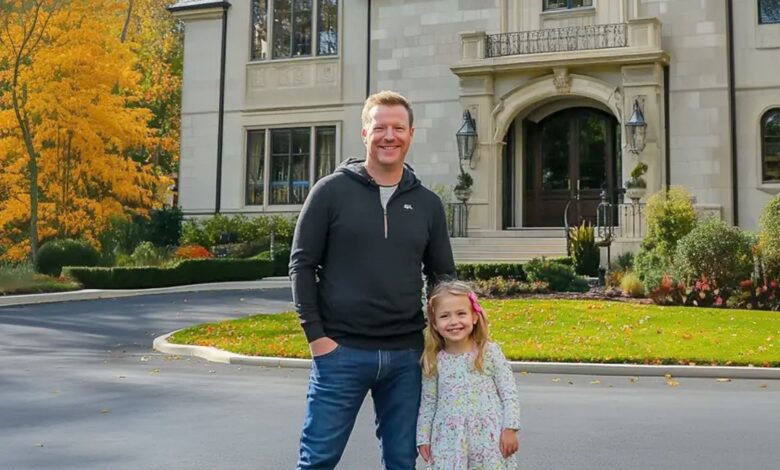I Saved a Little Girl, Then Saw a Photo in a Black Frame That Looked Just like Me in Her Wealthy Grandmas Mansion

Racing to save a young girl from the road left my heart pounding. But when I entered her grandmother’s mansion, time seemed to freeze as I noticed an old photograph on the wall—a man who looked just like me, but from an era long gone. I was compelled to ask: Who was he? The answer would forever haunt me.
Life in my quiet neighborhood just outside the city is usually uneventful. Streets lined with old maple trees and aging homes tell stories of another time. The autumn air carried the earthy scent of fallen leaves, a reminder of how everything changes—or so I thought. That October afternoon, on a simple trip to the store, everything changed.
On my way home, I noticed a little girl, no older than six, sitting in the middle of the road, clutching her scraped knee. Her bike lay on its side nearby, one wheel spinning idly. She was directly in the path of a dangerous curve known for speeding cars.
I felt my pulse spike as the sound of an engine grew louder. Without thinking, I dropped my groceries and dashed towards her, barely reaching her in time. I scooped her up just as a red sedan came careening around the corner, missing us by inches, leaving only the smell of burnt rubber behind. She clung to me, trembling and whispering, “I’m scared.”
When I finally set her down, she introduced herself as Evie. “Mommy drove away, and I tried to catch up on my bike,” she hiccuped, eyes brimming with fresh tears. As I guided her back home, she pointed towards a mansion with a grand iron gate, her grandmother’s home.
The mansion was something out of a movie, its grandeur imposing against the autumn sky. Evie pressed the gate’s intercom, and moments later, her grandmother—Vivienne—rushed out. Her relief at seeing Evie was palpable, and she embraced her granddaughter with tears in her eyes, thanking me profusely.
Inside, I sat uncomfortably on an antique velvet sofa, feeling out of place among the mansion’s opulence. Ornate chandeliers cast rainbows across the walls, and I marveled at the priceless art that adorned the rooms. Vivienne gently tended to Evie’s scraped knee, placing a whimsical unicorn bandage on it. As Evie scampered off to play, she cheerfully called me “Uncle Logan,” making me smile at her innocence.
But Vivienne’s gaze lingered on me, her face gradually draining of color as if she’d seen a ghost. Without a word, she led me down a hallway lined with framed family photographs, her hand gripping my arm tightly. Finally, we stopped before one particular photograph, and I found myself staring at an image that left me breathless.
In the sepia-toned frame was a man who could have been my mirror image. The resemblance was uncanny—same dark eyes, same sharp jawline, and even his faint smirk was a mirror of my own. But his attire, a perfectly tailored suit, belonged to another era. I turned to Vivienne in shock. “Who…who is he?”
Her voice trembled as she replied, “My brother, Henry. He vanished fifty years ago.” Her fingers brushed the edge of the frame as if lost in a memory. “We never knew what happened. He just disappeared one night, leaving us with endless questions.”
We settled in her study, the photograph between us on an antique coffee table. Rain started to patter against the windows, adding to the melancholy weight of her story. As she recounted Henry’s life—his charm, defiance, and final fight with their father—she shared how he had chosen a life of freedom over family duty, only to vanish without a trace.
I couldn’t shake the uncanny resemblance, nor could Vivienne. I, too, grew up with a mysterious absence. My father had left when I was young, and my mother, who recently passed, took whatever she knew about him to her grave. Suddenly, the parallels between Henry’s life and my own felt eerie.
After a long silence, I asked Vivienne, “If he caused so much hurt, why did you keep his photo all these years?”
She gave me a sad smile, tears glistening in her eyes. “Because love doesn’t vanish with disappointment. Henry was my brother. Yes, he was flawed, but he was also the boy who held my hand through our mother’s death and chased away my nightmares. People aren’t just good or bad. They’re human.”
In that moment, I saw my own life in a new light. Perhaps, like Henry, I was searching for something elusive, something to tie together the fragments of my past.